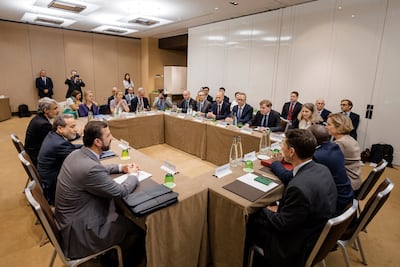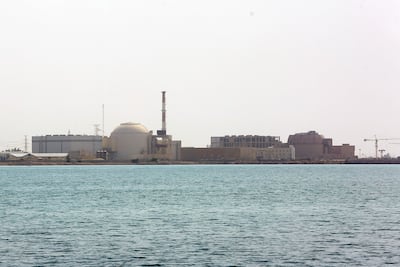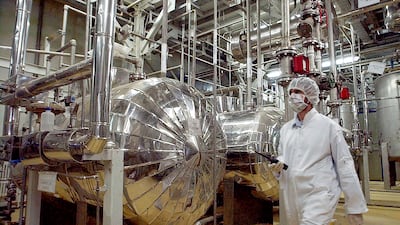France, Germany and the UK on Thursday triggered an unprecedented UN procedure to reinstate sanctions on Iran, which they deem in breach of a nuclear deal.
Six pre-existing but mothballed UN sanctions resolutions would come back into force for the first time since 2018 under the procedure.
"Iran's nuclear escalation must not go any further," French Foreign Minister Jean-Noel Barrot wrote on X on Thursday.
Collectively known as the E3, France, Germany and the UK made their decision after informing US Secretary of State Marco Rubio in a call on Wednesday. Mr Rubio welcomed the move, saying the three countries had laid out a clear case of Tehran's “significant non-performance" of its nuclear commitments, but said the US remains available for direct engagement with Iran.
A UK official said “we cannot allow the Iran nuclear file to fall off the agenda or for sanctions to be permanently lifted while Iran's programme escalates”, as the International Atomic Energy Agency (IAEA) is denied access to inspect Iranian nuclear sites, “in clear violation of Iran's legal obligations”.
Iran's Foreign Minister Abbas Araghchi, who was warned in a phone call an hour before the decision, said Iran "will respond appropriately to this illegal and unjustified action", Tasnim news agency reported. But he said later that Iran was ready to resume "fair and balanced" negotiations if the West shows goodwill, in a letter sent to EU foreign affairs chief Kaja Kallas.
Iran's Foreign Ministry called the move by the European countries "provocative" and said it would undermine co-operation with the IAEA. It warned it would be met with "appropriate responses", state news agency Irna reported.
Deadline
Under the 2015 agreement known as the JCPOA (Joint Comprehensive Plan of Action), sanctions against Iran were suspended but could be reimposed if participants believe Tehran is not sticking to the deal to limit its nuclear programme.
Late August was the deadline for the countries to give 30 days' notice of the decision to reimpose UN sanctions, known as snapback and widely described as their only leverage to prevent Iran from developing a nuclear weapon. The deal expires on October 18.
However, it is not the end of diplomacy. Europeans have signalled that last-minute talks with Iran are still possible in the 30-day window that has now opened before sanctions would kick in.
"Will it be easy? Honestly no. Iranians will probably be tempted to escalate," a French diplomat said. "At the same time, they have always come back to the negotiation table. The worst-case scenario is not the most obvious."

What happens now?
The UN Security Council must now vote within 30 days on a resolution to continue to suspend sanctions on Iran.
The E3's position means the resolution is destined to fail because it would require at least nine votes in favour and no vetoes by the US, Russia, China, Britain, or France to pass.
The E3 has already suggested a six-month extension of UN resolution 2231, which endorsed the JCPOA, during which they would be able to trigger snapback at any time – an offer Iran has publicly rejected.
"There is a sense of inertia within the Iranian political leadership, but that is also partly the result of the Europeans not giving Iran a real exit ramp," Ali Vaez, Iran project director at Crisis Group, told The National.
Russia has circulated a draft resolution at the UN Security Council suggesting a six-month extension of resolution 2231 but without the possibility of snapback – a move viewed with suspicion by the Europeans, who believe Moscow wants them to simply let the mechanism expire without using it.
Though the US, which withdrew from the nuclear deal in 2018, remains Iran's main interlocutor when it comes to its atomic programme, Europeans hope to keep a seat at the table should UN sanctions be lifted.
Diplomatic deadlock
The E3 have held several rounds of talks with Iran since Israel and the US struck its nuclear installations in mid-June.
But at the latest meeting in Geneva on Tuesday, held at Iran's request according to the French diplomat, did not yield sufficiently tangible commitments from Iran.
"Discussions were difficult – Iranians appeared slightly more flexible but not enough," the French diplomat said.
The E3's main ask from Iran is to account for the whereabouts of 400kg of uranium enriched at 60 per cent, in violation of the nuclear deal. The Europeans have requested a mechanism to be set up for the unaccounted stockpile, which they believe represents nine times the amount of material necessary to produce a nuclear bomb.
A UK official said Iran's stockpile was 45 times the agreed cap of 300kg of 3.67 per cent-enriched uranium. The number of advanced centrifuges in operation before the recent 12-day war with Israel and the US resulted in inspectors withdrawing from the sites was 10 times the deal's limit.
At talks held in Geneva on Tuesday at political director level with Iran's deputy foreign ministers, Europeans were unconvinced by Iranian arguments alleging they were unable to find the uranium because it had been buried by Israeli strikes, which killed more than 1,000 people in Iran in June. Iranians reportedly added that they could not search for it out of fear of being attacked by Israel again.
"We cannot exclude that, despite Israeli strikes, Iran has moved the enriched uranium and re-enriching it to 90 per cent," the French diplomatic source said, adding that there were no intelligence reports that backed this possibility.

Iran has also reportedly been reluctant to detail how it plans to co-operate with IAEA inspectors, who were allowed this week to return to Iran for the first time since the 12-day war.
Yet they were allowed only to visit Bushehr, Iran's sole civilian nuclear power plant, which runs on Russian-enriched uranium. Europeans view this as an insufficient step.
Europeans want Iran to return to negotiations with the US, which had begun in April but were interrupted by the Israeli bombing campaign three months later. Iran has ruled out direct talks.
Europe is not offering any positive incentives, Mr Vaez told The National. "They have asked Iran to restore IAEA access, account for the missing uranium stockpile and engage in direct talks with the US in return for holding the Damocles sword over their neck for another six months," he said. "Also, Iran needs security guarantees and sanctions relief, which are not in the Europeans’ gift to offer as only the US holds that power."

